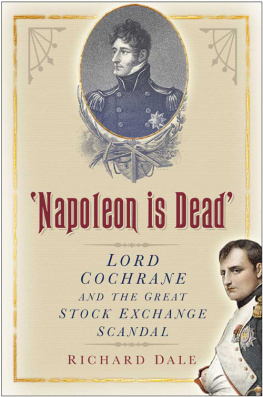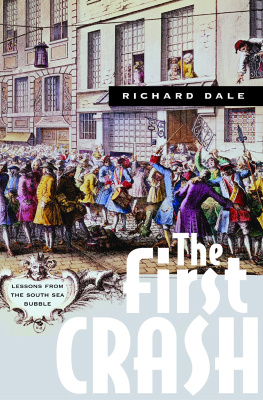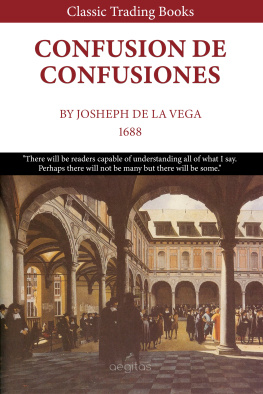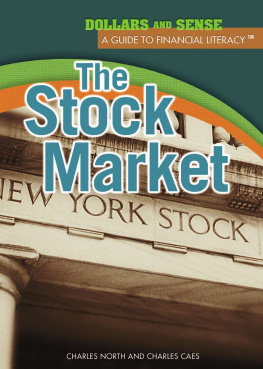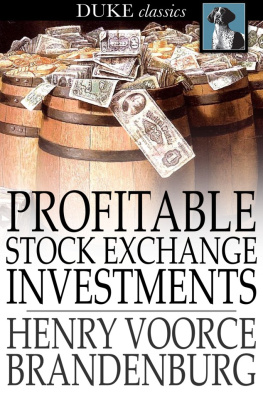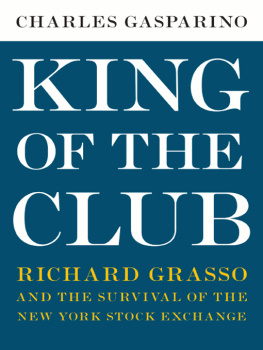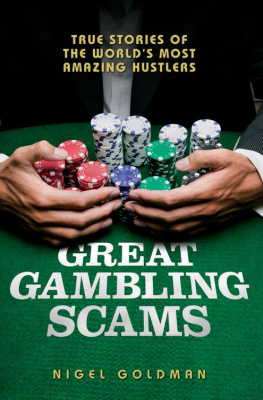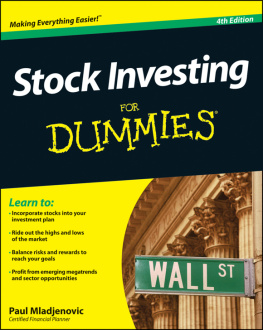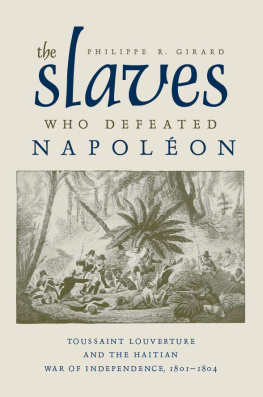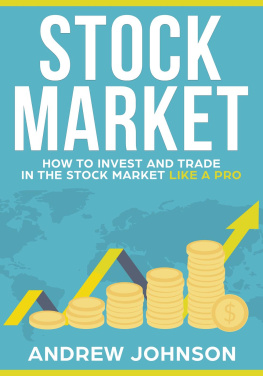Napoleon is Dead
Napoleon is Dead
Lord Cochrane
and the Great
Stock Exchange Scandal
R ICHARD D ALE
First published in 2006
The History Press
The Mill, Brimscombe Port
Stroud, Gloucestershire, GL 5 2 QG
www.thehistorypress.co.uk
This ebook edition first published in 2013
All rights reserved
Richard Dale, 2006, 2013
The right of Richard Dale to be identified as the Author of this work has been asserted in accordance with the Copyrights, Designs and Patents Act 1988.
This ebook is copyright material and must not be copied, reproduced, transferred, distributed, leased, licensed or publicly performed or used in any way except as specifically permitted in writing by the publishers, as allowed under the terms and conditions under which it was purchased or as strictly permitted by applicable copyright law. Any unauthorised distribution or use of this text may be a direct infringement of the authors and publishers rights, and those responsible may be liable in law accordingly.
EPUB ISBN 978 0 7524 9601 6
Original typesetting by The History Press
To the memory of my father, 19112006
Contents
Preface
T he name of Thomas Cochrane should be better known. He commanded no great fleets, he was associated with no single large-scale action on which the fate of nations turned and he served for much of his active life as a mercenary under foreign flags. Yet Cochrane was one of the most brilliant naval commanders the world has known and certainly unrivalled in his time in single-ship combat and as a leader of small battle squadrons. He wrought havoc on the French, Spanish and Portuguese navies in Channel waters, the Mediterranean, the Atlantic and the Pacific, he terrorised onshore garrisons and fortified anchorages along the French, Spanish and South American coasts and he was accorded high honours by the governments of Brazil, Chile and Greece as well as Britain in recognition of his exceptional contribution to the cause of freedom and independence in these countries. This book, however, does not set out to eulogise Cochranes extraordinary achievements at sea. Instead, it focuses on a darker chapter in the naval heros career one that drove him from his native country, changed the course of his life and cast a long shadow over his later years.
Acknowledgements
I would like to thank the Earl of Dundonald for his generosity in allowing me free use of the Dundonald family papers deposited with the National Archives of Scotland, including in particular the trial documents previously held by Farrer & Co., Lord Cochranes solicitors in 1814. I would like also to thank the staff of the National Archives of Scotland and especially David Brown, who offered helpful insights on the interpretation of certain documents. I also received valuable assistance from the staff of the Inner Temple Library, the British Library and the Plymouth Naval Studies Library. Finally, I would like to express my gratitude to Farrer & Co., who were most helpful in guiding me towards relevant documentary sources and in making available material from their own legal archives.
Authors Note
T he main source for the Stock Exchange trial is the published transcript of the court proceedings taken down by William Gurney, who was short-hand writer to both Houses of Parliament. In describing the trial and the events preceding it I have adhered closely to the verbatim evidence of witnesses and the speeches of counsel presented in this transcript, although grammar and style have been adjusted occasionally to help the modern reader. The italics and underlining in quoted material indicate original emphasis unless otherwise stated.
I have quoted from the personal letters of Cochrane and his wife, Kitty, which are to be found in the Dundonald family papers deposited with the National Archives of Scotland, although much of this correspondence is also cited by Ian Grimble in his biography of Cochrane. The letters from de Berenger to Cochrane from which I have quoted are published as appendices to de Berengers book The Noble Stockjobber. The quotations from Henry Crabb Robinsons diary for 1814 are cited by Henry Cecil in his book A Matter of Speculation.
The new evidence I have drawn upon is to be found in the trial papers lent to the National Archives of Scotland by the Earl of Dundonald, which were formerly held by Farrer & Co. These documents include the defence briefs prepared for Cochrane, Cochrane Johnstone and Butt, pre-trial correspondence between Cochrane and his solicitors, depositions and affidavits, case notes, various trial-related memoranda and Cochranes charges against Farrers as well as their response.
ONE
February 1814
F or England the year 1814 opened with great promise. There was at long last a real prospect that Napoleon would finally be crushed by the Allies massively superior forces under the command of Blcher and Schwarzenburg. Indeed, so confident of victory were the Allied leaders that they had begun to compile seating plans for dinner parties to be held at the Palais Royal in Paris. Yet, against all the odds, Napoleon was able to exploit a fleeting opportunity that presented itself in early February, when the Allied armies separated, to inflict a series of lightning defeats, first on the Silesian army of Blcher and then on the Russo-Austrian forces of Schwarzenburg. It was in the context of these bewildering changes of fortune on the battlefield, as well as uncertainties surrounding the parallel peace negotiations taking place in Chtillon, that rumours and counter-rumours swept through London and its financial markets in mid-February.
The market in government bonds was especially sensitive to military and political developments across the Channel, and during these crucial weeks the two most actively traded government securities Consols and Omnium fluctuated in response to every rumour. On Thursday 10 February, for instance, the afternoon edition of The Courier reported unsubstantiated rumours of Napoleons downfall: some say that Bonaparte has been killed in battle, others that he has been assassinated, that Paris is surrounded by the Allies... and that the Senate is in Treaty with the Allied Sovereigns. Over the next three days, the premium on Omnium increased from 20 per cent to 28 per cent and Consols rose by 7 per cent to 71. Yet on Monday 14 February the news was reversed: The Courier reported information received from Dover, based on contacts between fishing boats off Saint-Valery, that Bonaparte had won a great victory. The premium on Omnium fell back to 25 per cent and Consols dropped by 4 per cent, while across the Channel French funds rose by 34 per cent.
Although government bonds may have fluctuated by only a few percentage points, the gains or losses represented by these movements were hugely magnified by the practice of buying stock without immediately paying for it. An investor might, for instance, buy Omnium for the account, in which case the purchase price would not have to be settled until the next Stock Exchange account date by which time the purchaser would hope to have made a successful offsetting sale. Alternatively, a forward contract, specifying some other longer-term settlement date, might be entered into. Sales of stock could also be for time, so that the seller need not be in possession of the stock at the time of sale: a seller who had sold forward in this way would be hoping to buy the stock more cheaply before the settlement date.
Given the vital importance of news from the Continent, Stock Exchange speculators, or plungers as they were called, were prompted to develop their own sources of information as Rothschild was to demonstrate the following year when he famously benefited from being first with the news of Waterloo. Some investors, as well as newspapers, maintained agents at the Channel ports to relay information to them in London as soon as it was brought ashore whether from fishing vessels, merchant ships or naval patrols. Messages could then be rushed up to London in a matter of hours, either by express rider or, if to be delivered in person, by post-chaise.

